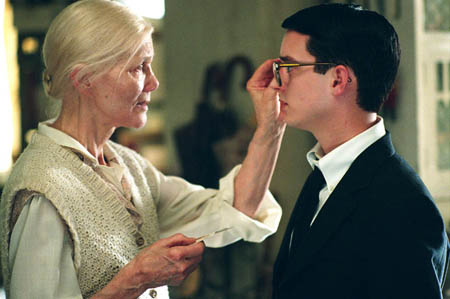|
Reviews of Recent Independent, Foreign, & Documentary Films in Theaters and DVD/Home Video
EVERYTHING IS ILLUMINATED
Things have gone somewhat awry lately. We're living in a world where Oprah's Book Club is now finishing up its recent "Summer of Faulkner" kick, where Dave Eggers (of the experimental A Heartbreaking Work of Staggering Genius) has recently become the self-appointed president of "the American literary community" while no one was looking, and where actor Liev Schreiber read one of the most complicated intertextual pieces of popular post-post-modernist metafiction in recent years and thought it would be a good way to start his directorial career. Postmodernism has gotten a little topsy-turvy, to say the least.
The film focuses largely on the first section of the multi-narrative novel, which relates how Jonathan Safran Foer (Elijah Wood) comes upon a clue to his family's forgotten history - an unidentified photograph of the woman who saved Jonathan's grandfather from the Nazis. Taking the initiative to reconnect with the past, he calls a defunct company in Ukraine that used to help "rich Jews" find their lost relatives, run by Grandfather (Boris Leskin), who pretends to be blind, and his grandson Alex (Eugene Hutz), who pretends to be a club kid. While the three characters deal with their obvious differences of culture, age, country, language, religion, and personality, it quickly becomes clear that they could not be more similar. By the end, Jonathan's scavenger hunt of the past gives way to a sharing of history, memory, and experience that questions the systems of identity that only isolate us from each other. It's all very existential.
But that's the only worthwhile aspect about this movie: the ideas behind it. Schreiber's necessary reduction of the book feels jolted, unsure of which story lines to include and how to frame them. The movie jumps from Holocaust humor to Holocaust shooting gallery in about five minutes flat, and Schreiber seems to struggle with the pace of his characters' spiritual advancements. And the jokes, the novel's biting stylistic backbone, awkwardly stand out when represented visually. Even though the novel was criticized for relying on more postmodern gimmicks than postmodern concepts, those gimmicks are made even more apparent when reconstructed onscreen. Foer has said he feels his book is wholly separate from Schreiber's movie, but it's useless to talk of one without the other when the film has merely lifted content from the novel in order to reach the same intellectual points.
Though Schreiber is not the Charlie Kaufman the source material needs, the film actually has everything else going for it. There is wonderful acting by theater veteran Boris Leskin and Eugene Hutz, who amazingly has never acted before in his life. The actors are suitable foils for each other's characters, and their contrast becomes the film's most interesting dyad. Supplementing this, Matthew Libatique (Tigerland, Requiem for a Dream) frames the post-war Czech countryside to give a fitting backdrop to the lively music of Gogol Bordello (the sizeable Ukranian group of which Hutz is a member). But without a more edited and evocative script, the movie feels like a trailer for the book - insufficient and teasing. Zachary Jones
|
